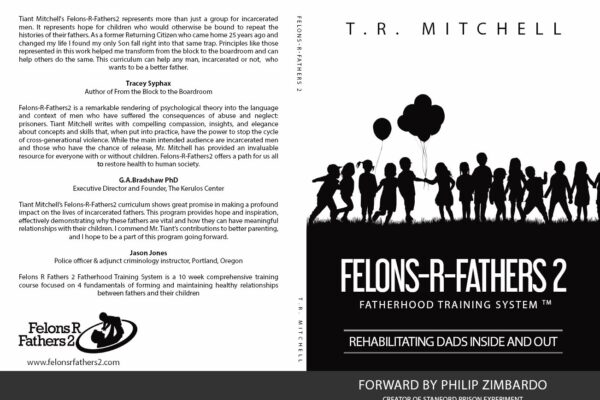The Animal Allies Story
Inspired by Gay Bradshaw’s Pulitzer Prize-nominated Elephants on the Edge: What Animals Teach Us about Humanity (Yale 2009), clinical psychologist Dr. Tina Bloom shared a story about traumatized young male Elephants with her Peer Assistants at the maximum security prison for men where she worked for nine years. They were galvanized. The parallels between the experiences of the traumatized young male Elephant (bulls) and their own were remarkable. Both male Elephants and humans had, as children, lost their families to violence, were forced to survive on their own in a hostile environment, and never had the chance to receive traditional mentoring by elders. Together, these traumas lead to symptoms of PTSD.
Peer Assistant prisoner, Tiant Mitchell, was so moved by the Elephants that he wrote a manual to teach fellow prisoners how to be fathers to their children, even while behind bars. Endorsed by Stanford University professor of Psychology, Dr. Phillip Zimbardo, Felons R Fathers 2 is now in press for publication.
The process leading to the creation of FRF2 is a perfect example of how Animals provide ethical exemplars and agents who inspire human transformation. Tina and Tiant’s mutually respectful, trauma-informed therapeutic relationship lay the foundation for introducing the Elephants, and led to their contacting Kerulos.
Tina reflects, “By bringing the Elephants into the conversation, the experience of one expanded to the scale of two, three, and entire community, which is unbound by prison walls. The Elephants opened the hearts and minds of prisoners. In so doing, the entire human project was re-framed as a trans-species movement for social justice and healing.” By recognizing kinship with Elephants and other Animals, humanity discovers the path back to wellness guided by our nonhuman kin.
Publications & Presentations
Publications
Bloom, T. & Bradshaw, G. A. (2021). Inside a Prison: How a Culture of Punishment Prevents Rehabilitation. Peace and Conflict Journal of Peace Psychology.
Bloom, T., Serrano, B. R., & Bradshaw, G. A. (2021). In the company of animals: Accompaniment transforms prisoners into colleagues and teachers. The Humanistic Psychologist.
Bloom, T. & Bradshaw, G. A. (2017). Elephants in the forest: A nature-based re-entry program. Paper presented at the 25th Annual Forensic Rights and Treatment Conference, Drexel University College of Medicine Division of Behavioral Healthcare Rehabilitation, Grantville, PA.
Bloom, T. & Bradshaw, G. A. (2018). Attachment-based, trauma informed therapy: Transforming prisoners into colleagues. Paper presented at the 26th Annual Forensic Rights and Treatment Conference, Drexel University College of Medicine Division of Behavioral Healthcare Rehabilitation, Grantville, PA.
Bloom, T., Bradshaw, G. A., & Friedman, H. L. (2018). Pachyderms and prisoners: Wildlife as architects for humanity. Paper presented at the 126th American Psychological Association Annual Convention, San Francisco, CA.
Bradshaw, G. A., & Bloom, T. (2019). Come to kale: Accompaniment across barriers of species and situations. Paper presented at the 127th American Psychological Association Annual Convention, Chicago, IL.
Bradshaw, G. A., & Bloom, T. (2020). The cage within: Healing from a life of incarceration. Paper presented at the 128th American Psychological Association Annual Convention, Washington, DC, (Virtual).






